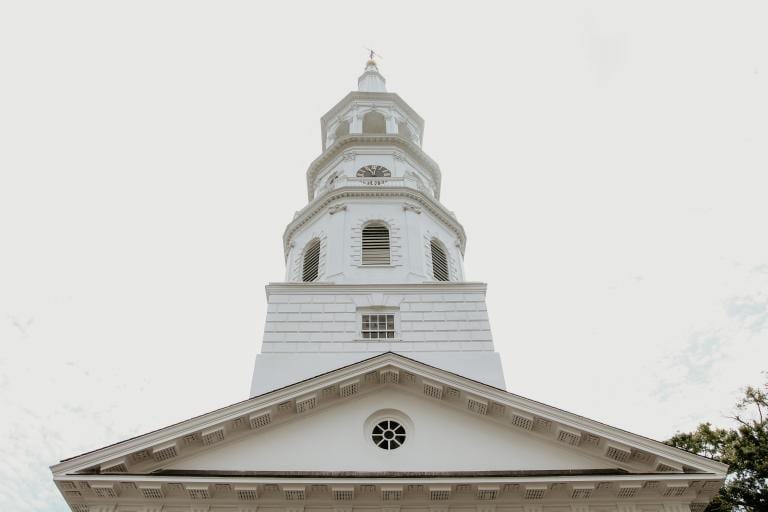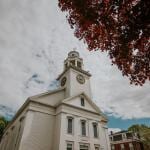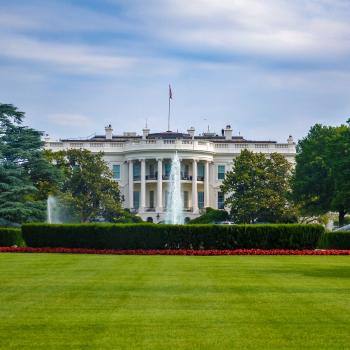
I have lately been posting notes from New England election sermons (from the 17th and 18th centuries) in an effort to combat the less-than-helpful political analysis floating around out there this time of year from platformed pastors and evangelical elite think pieces. Accordingly, I thought it might be helpful to consider briefly the history, nature, and purpose of these sermons.
In his magisterial study of New England preaching, The New England Soul, Harry Stout highlights the ubiquity and dominance of the sermon medium throughout the 17th and 18th centuries. As media, the sermon was unrivaled.
“Unlike modern mass media, the sermon stood alone in local New England contexts as the only regular (at least weekly) medium of public communication.” Accordingly, sermons covered a range of topical issues; they were the primary source of information for most colonists. Many of the sermons, especially occasional ones (see below) were widely circulated in print after being delivered.
“As the only even in public assembly that regularly brought the entire community together, [the sermon] also represented the central ritual of social order and control. Seldom, if ever before, did so many people hear the same message of purpose and direction over so long a period of time as did the New England Puritans.”
Stout estimates that the ratio of preachers to general population was the lowest in the Protestant world. By the end of the 18th century there were some 720 Congregational churches in New England. Twice every Sunday the word was preached to a covenanted people—and church attendance far outpaced church membership (even after the provisions of the Half-Way Covenant were in place). Each sermon ran for upwards of two hours. At least once during the week an additional sermon was given, as well as a Thursday theology lecture. “Collectively over the entire span of the colonial period [in New England], sermons totaled over five million separate messages in a society whose population never exceeded one-half million, and whose principle city [i.e. Boston] never grew beyond seventeen thousand.” The result was that the average New Englander listened to nearly seven thousand sermons in their life, or fifteen thousand hours of listening.” By the end of the 18th century, Congregational ministers were delivering over two thousand discourses a week, and, as stated, publishing many of them; and that at a “rate that outnumbered secular pamphlets (from all the colonies) by a ration of more than four to one.” For New England, the 17th and 18th centuries comprised the age of the sermon.
And per Stout, the substance or content of the sermons throughout the period of study was remarkably consistent. If there is any validity to the old, tired narrative of decline and secularization in New England, evidence of such is not found in sermons. Stout notes that the failure to recognize the distinction between regular and occasional sermons by many scholars may have led to the aforementioned narrative of decline.
This distinction is important to remember when reviewing New England election sermons. “On Sundays,” recalls Stout, “ministers would be gospel heralds proclaiming the way of personal salvation through faith in Christ; on weekdays—as the occasion required—they would become social guardians telling the nation who they were and what they must do to retain god’s special covenant interest.”
The occasions of occasional sermons varied. Fast days (or days of public humiliation) called by the civil authorities, execution day orations, artillery days, and election days all qualified as occasions appropriate for a declaration from God’s word. All but the election day sermons, however, were truly occasional. That is, the election day was consistently observed on an annual basis. It was the closest thing to a civil holiday that the New England colonies enjoyed (usually every May). The first election sermon was preached in 1634 (John Cotton), and the practice began in earnest after 1640—initially they were preached at Boston’s First Church but later (after 1658) at the Town House.
Stout paints a weighty picture of the setting of the election day discourse:
“There, seated before the speaker in the principal building of the province, were the three orders of authority: the magistrates…the deputies… the ministers. Each would be addressed in turn so that all aspects of government and authority would illuminated by the Word of God… With all the ‘tribes’ gathered before him, the minister would speak and channel all the words of his peers into one voice of God to his New England people.”
“As the speaker entered the pulpit, the mood was expectant. What followed marked the moment of superb oratory in a culture that valued the spoken word above all other art forms. The speaker’s goal was not to be innovative or entertaining, but to recall for his audience the vision that first impelled New England’s mission.”
Based on what has been said above, I would contend that it is not incumbent upon contemporary pastors to preach election sermons in place of their regular Sunday preaching schedule. Indeed, the Congregational ministers in view above would have advised against it. The reality is that we no longer have in place the structure and expectations to support occasional sermons in the same way as the Puritans did. The regular preaching of the full counsel of God should not give way to the moment. Unless you, pastor, are serving in a church that provides opportunity for weekday and occasional orations—and if you are then I would love to hear from you—then an election sermon this coming week from you would be improper. It is worth remembering that the election sermons were delivered to the entire town and legislature, usually off-site, not a local congregation.
The occasion and structure requisite for election sermons have not endured, and neither have the underlying the political culture and church-state dynamics. As I have written elsewhere, the political life of the New Englanders, especially in the 17th century, was fundamentally integralist. Stout does not seem to fully appreciate this (as Perry Miller was more apt to) but still manages to emphasize “New England’s unique social structure of interlocking institutions governed by a single nucleus of covenanted saints,” which “endowed the sermon with unprecedented range and influence.” The people were covenanted with each other before (and with) God to pursue the glory of God in all of their dealings (coram Deo). Church and state, as John Cotton put it, were coordinate powers within the same community, both ultimately ordered to the same end. The state, then, was charged with (as many of the election sermons evidence) supporting true religion, protecting and preserving the church (her doctrine and worship), and punishing idolatry, blasphemy, and the like according to the way in which those sins were defined by the word of God as preached by the clergy. There were always questions of original jurisdiction on a particular matter, whether church or state, but the two worked in tandem and in a spirit of mutual support. Hence, John Cotton and Nathaniel Ward, among other clergy, were asked by the General Court to draft the early codes of law for the Massachusetts Bay Colony in accordance with God’s word. Leading clergy of the townships were frequently consulted on legislative matters by the magistrates and governors. Though the laws of New England were not mere regurgitations of Biblical verses, as some have erroneously implied, the shared source of authority for all things between church and state, viz., Scripture, meant that the intercourse between church and state enjoyed an agreed upon basis.
Election days were an expression and renewal of this relationship. The character of the good ruler, so emphasized by the lion’s share of election sermons from the period, was so important because the duty of the ruler vis a vis the church could only be performed by a virtuous and just candidate. The common good (which necessarily included the eternal good) of society would only be rightly acknowledged and pursued by a ruler that consecrated himself before God. The election days were, in many ways, a liturgical event; a renewal of the covenant, much like the periodic covenant renewal ceremonies in the towns and local congregations.
This is simply no longer our context. Hence, the place and influence of the election sermon has been supplanted. The utility of reading these sermons is found, then, not in mimicking their delivery, but in pondering their insights as we consider our own election and national political dynamics as Christians today. Doubtless, pastors may find therein wisdom to apply to their own exegesis and application of relevant texts. But the entire custom of election day preaching should not, in my estimation—given the evident contextual and chronological divide between ourselves and the men preaching in the Puritan era of New England—be reintroduced at this time. Lamentably, there is no real place for them, at least not a place analogous to the one they used to occupy (I am open to be convinced otherwise).
Image credit: @alexblakephotography/Unsplash












